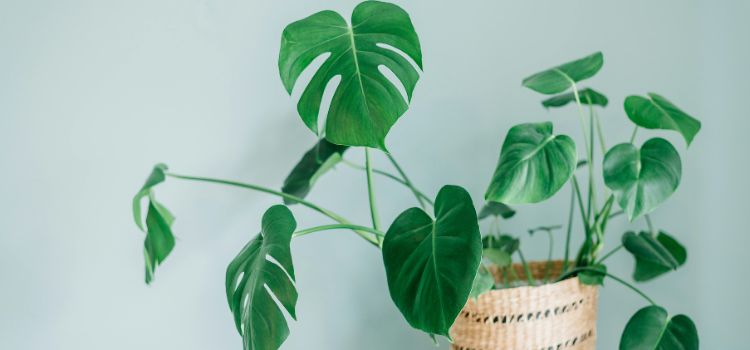As an Amazon Associate, I earn from qualifying purchases.
Your Monstera plant may lean to one side due to uneven light exposure or inadequate support. Overwatering and root issues can also cause leaning.
It’s important to note that Monstera plants, with their lush foliage and tropical vibe, naturally grow towards the light. This behaviour, if not managed properly, can result in a leaning appearance. Understanding this natural growth pattern can help you appreciate your plant’s behaviour and adjust your care accordingly.
Providing consistent, indirect sunlight and rotating the plant periodically can prevent leaning. Additionally, Monsteras are climbing plants and may require support, such as a moss pole, to maintain an upright position as they grow. Ensuring proper care, including the correct water balance and a sturdy support system, can help your Monstera thrive and stay upright.

Common Reasons For Monstera Plant Leaning
Is your Monstera plant starting to lean to one side? This could be a sign that it needs extra care.
Monstera plants love light. Without it, they might lean towards the nearest light source. This natural behaviour is called phototropism. Your plant is simply trying to get as much light as it can. To prevent leaning, rotate your plant regularly. This encourages even growth on all sides.
Water plays a huge role in plant health. Too much or too little can cause problems. Overwatering can lead to root rot, which weakens the plant. On the other hand, underwatering can cause the soil to dry out and the plant to droop. Keep a consistent watering schedule. Make sure the soil is moist but not soggy.
Monsteras are natural climbers. In the wild, they use trees for support. In your home, they need something similar. A sturdy stake or trellis can help. Secure your Monstera to the support using soft ties. This prevents learning and encourages vertical growth.
If your Monstera’s roots have no room to grow, it may start to lean. This is a sign it’s time to repot. Choose a pot that is a couple of inches more prominent in diameter than the old one. Use fresh potting soil to give your Monstera a nutrient boost. This should help it stand tall once again.
Uneven Light Exposure
Is your Monstera plant leaning to one side? Uneven light exposure could be the culprit. Plants naturally grow towards light sources. This can cause them to lean if the light is not balanced. Let’s explore how light affects your Monstera.
Natural Light Changes
Monstera plants love consistent, indirect sunlight. As seasons change, so does the sun’s position. This can lead to uneven light in your home.
- Rotate your plant regularly to ensure all sides receive light.
- Consider sheer curtains to diffuse direct sunlight.
- Move your Monstera to a spot with more balanced natural light.
Artificial Light Issues
Indoor lighting can also impact your Monstera’s growth. Incorrectly placed lamps or bulbs can create uneven growth patterns.
| Light Source | Distance from Plant | Duration |
|---|---|---|
| LED Grow Light | 24-36 inches | 12 hours daily |
| Fluorescent Bulb | 12-24 inches | 14 hours daily |
Check your light setup and adjust for even growth. You might need to reposition lights or change the type of bulbs you use.

Watering Imbalance
Your Monstera’s lean could signal a cry for help, specifically concerning its watering routine. Too much or too little water disrupts the plant’s stability and health. Discovering the right balance is critical. Let’s explore how overwatering and underwatering can cause your Monstera to tilt to one side.
Overwatering
Overwatering is a common issue that can lead to your Monstera plant leaning. Excessive water in the soil makes it heavy, causing the plant to tip over. Signs of overwatering include:
- Yellowing leaves
- Soft, mushy stem base
- Stunted growth
Ensure your Monstera has well-draining soil and a pot with adequate drainage holes. These prevent water from accumulating at the roots.
Underwatering
Conversely, underwatering can also cause your Monstera to lean. Without enough water, the plant’s cells lose rigidity. This leads to drooping or leaning. Watch out for:
- Dry, crispy leaves
- Soil pulling away from the pot edges
To prevent underwatering, check the soil moisture regularly. When the top inch of soil feels dry, it’s time to water your plant.
Inadequate Support
Monstera plants often lean when they lack proper support. These tropical natives are climbers in their natural habitat. They need structures to cling to and rise towards the sunlight. Without this support, your Monstera may tilt, risking damage to its stem and leaves.
Staking
Staking provides a simple solution for a leaning Monstera. Insert a stake into the soil close to the main stem. Tie the plant gently to the stake using soft materials like cotton ties or velcro. Ensure the stake is tall enough for the plant to grow.
Trellising
Trellising offers a sturdy framework for Monsteras. A trellis helps distribute the plant’s weight evenly. This support mimics trees that Monsteras would climb in the wild. Position the trellis in the pot and carefully weave the stems through the openings.
Supporting With A Moss Pole
A moss pole replicates a Monstera’s natural climbing environment. It offers a moist surface that encourages aerial root growth. Secure the Monstera’s stem to the pole with ties as it grows. This ensures your plant stays upright and healthy.
Root Bound Condition
If your Monstera plant is leaning, it might be rootbound. This means its roots have filled the pot, leaving no room to grow. This can stress the plant, causing it to lean or look unhealthy.
Symptoms Of Root Bound Condition
Recognizing a root-bound condition is vital to fixing it. Here are some signs:
- Roots are visible at the surface of the soil.
- Roots poke out of the pot’s drainage holes.
- The plant stops growing or grows very slowly.
- Leaves may be yellow or droop.
- Water runs straight through the pot.
Solutions For Root Bound Condition
To help a root-bound Monstera, follow these steps:
- Remove the plant carefully from its pot.
- Check the roots. If they circle tightly, it’s root-bound.
- Choose a larger pot. It should be 2-3 inches bigger.
- Use fresh potting soil. Fill the new pot partly with it.
- Trim the roots gently if they are very long.
- Place the plant in the new pot. Fill around it with soil.
- Water the plant well.
This care can make your Monstera happy and healthy again.
How To Fix The Leaning Problem
Is your Monstera plant leaning to one side? This common issue can cause concern for plant enthusiasts. But fear not, as there are several straightforward solutions to help your Monstera stand tall and proud once again.

Diagnosing The Problem
To fix a leaning Monstera, start by understanding the cause. Check for uneven growth, inspect the soil condition, and note the direction of light. These clues will help pinpoint the reason behind the lean.
- Uneven Growth: Look for longer stems on one side.
- Soil Condition: Feel the soil. Is it too dry or too wet?
- Direction of Light: Observe if the plant is reaching towards a light source.
Correcting The Light Exposure Issue
Monstera plants lean towards light. Ensure even light distribution to correct this. Rotate your plant regularly for balanced growth. Consider using a grow light if natural light is insufficient.
Adjusting The Watering Schedule
Over or under-watering can contribute to learning. Adjust your watering routine to when the top inch of soil is dry. Ensure your Monstera gets a consistent amount of water.
Providing Adequate Support
Monsteras are climbing plants and need support as they grow. Use a moss pole or trellis to encourage upward growth and reduce leaning.
Repotting The Plant
If your Monstera is outgrowing its pot, it may start to lean. Report it in a larger container with fresh soil to give its roots more room to expand. This can help stabilize your plant.
Prevention Measures
Monstera plants can lean for several reasons, including seeking light or due to uneven growth. Preventative measures can ensure your Monstera remains upright and healthy.
Regular Pruning
Pruning helps maintain plant shape and promotes healthy growth. Trim any overgrown leaves or stems. Use sharp, clean shears to avoid damage. Prune regularly to prevent your Monstera from leaning.
Proper Watering Techniques
Over-watering or under-watering can stress plants, causing them to lean. Water when the top inch of soil feels dry. Ensure your pot has drainage holes to prevent water logging.
Choosing The Right Container
Select a container that supports your plant’s size. A pot too small can cause tipping. A pot too large may retain excess water. Ensure the container is sturdy and balances the weight of your Monstera.
Providing Adequate Light And Humidity
Monsteras need bright, indirect light and high humidity. Position your plant near a window with filtered sunlight. Rotate the pot occasionally for even growth. Use a humidifier or misting to maintain humidity levels.
Frequently Asked Questions
To stop your Monstera from leaning, provide a sturdy stake or moss pole for support. Ensure it gets balanced and that indirect sunlight promotes even growth. Rotate the plant periodically to encourage upright growth. Check the soil moisture level regularly and adjust as needed.
Support your Monstera with a moss pole or trellis. Ensure it receives bright, indirect light to promote upward growth. Regularly rotate the pot for even exposure. Keep the soil consistently moist and provide a balanced fertilizer for optimal health and stability during the growing season.
Stabilize the soil around the base, gently straighten the plant, and add support like a stake or trellis. Ensure proper watering and lighting to encourage straight growth. Prune excess weight if necessary.
Yes, Monsteras tend to lean towards light. They exhibit phototropism, growing toward their light source to maximize photosynthesis. Regularly rotating your Monstera can encourage even growth.
Conclusion
Ensuring your Monstera stands tall and healthy is simpler than you might think. Regular checks for adequate light, watering, and stable support will keep it thriving. Don’t let a leaning Monstera dampen your indoor gardening spirit; a little care goes a long way in maintaining its beauty and structure.
Happy gardening!

